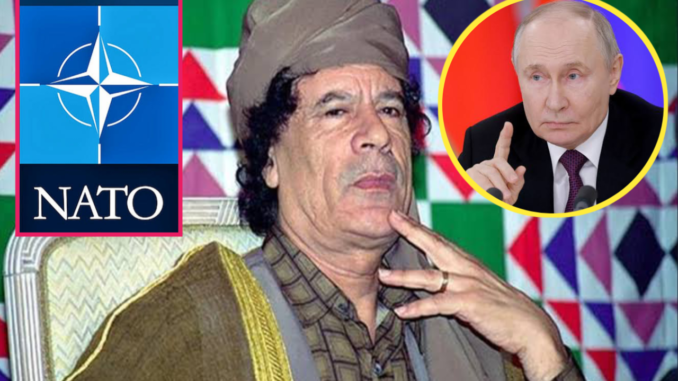
Russian President Vladimir Putin has repeatedly voiced his strong opinions on the brutal killing of Muammar Gaddafi, Libya’s former dictator, who met a gruesome end at the hands of rebel forces on October 20, 2011, following a NATO-backed military campaign.
Putin’s remarks over the years have oscillated between raw disgust at the savagery of Gaddafi’s death, scathing critiques of Western military interference, and a broader geopolitical warning against what he sees as NATO and America’s unchecked aggression.
These statements, spanning the immediate aftermath of the Libyan conflict to later years, offer a revealing glimpse into Putin’s mindset—his deep-seated suspicion of the West, his aversion to externally imposed regime changes, and his strategic anxieties about similar interventions targeting Russia or its allies. Below is a comprehensive breakdown of Putin’s evolving rhetoric on Gaddafi’s demise, drawing from documented speeches and interviews from 2011 onward.
First Response: Horror at the Barbarity (October 2011)
Putin’s initial reaction to Gaddafi’s death came just days after the event, on October 26, 2011, while he was still Russia’s prime minister. Speaking at a political rally in Moscow, he did not hold back his revulsion at the globally televised images of Gaddafi’s final moments.
“Nearly all of Gaddafi’s family has been wiped out, and his bloodied corpse was paraded across every major news network—it was sickening to watch,” Putin said. He went further, describing the scene in grim detail: “The man was still alive, drenched in his own blood, as they beat and shot him like an animal.”
At this stage, Putin’s focus was less on assigning blame and more on condemning the sheer inhumanity of the act. He avoided directly accusing NATO or Libya’s rebel forces, calling that a “separate discussion,” but his words carried an unmistakable moral outrage. This sentiment was reinforced by Russian Foreign Minister Sergei Lavrov, who demanded an official inquiry into Gaddafi’s killing—a clear signal of Moscow’s disapproval.
Early Condemnation of NATO’s Role (April 2011)
Months before Gaddafi’s death, as NATO airstrikes pounded Libya, Putin had already begun condemning the West’s military campaign. On April 26, 2011, during a visit to Denmark, he launched a blistering attack on the intervention, questioning its legality and morality.
“First, they claimed they weren’t trying to kill Gaddafi. Now, some officials admit they were targeting him. Who gave them that right? Was there a trial? Who appointed them judge, jury, and executioner?” Putin demanded.
He conceded that Gaddafi’s rule was far from just but argued that this did not legitimize foreign interference. “If we start removing every ‘crooked’ regime, where does it end? Will NATO invade half the world?” He also mocked NATO’s bombing of Gaddafi’s palaces, sarcastically asking, “Were they dropping bombs to exterminate rats?”
These remarks framed the intervention as lawless and hypocritical—a recurring theme in Putin’s later critiques.
Direct Accusations Against the U.S. (December 2011)
By December 15, 2011, Putin had sharpened his accusations, this time implicating the United States in Gaddafi’s execution. During a live Q&A session with Russian citizens, he alleged a covert U.S. operation.
“American drones struck Gaddafi’s convoy. Then, through special forces—who had no business being there—they handed him over to the rebels, who butchered him without a trial,” Putin claimed.
This narrative went beyond Western official accounts, which acknowledged a drone strike but denied any direct U.S. role in Gaddafi’s lynching. Putin’s comments came amid rising tensions with the West, including accusations of U.S. interference in Russian elections. He framed Gaddafi’s death as proof of Western hypocrisy, sneering, “Is this their idea of democracy?”
The Psychological and Strategic Fallout
Multiple reports suggest Gaddafi’s fate left a lasting impression on Putin. Journalist Mikhail Zygar wrote that Putin watched the footage repeatedly, growing increasingly furious. According to Zygar, Putin saw Gaddafi’s downfall—coming after he had tried to reconcile with the West—as a cautionary tale: cooperation with the U.S. and Europe could be fatal.
This mindset reportedly influenced Putin’s decision to reclaim the presidency in 2012 and his later intervention in Syria to protect Bashar al-Assad, another leader facing Western-backed opposition.
In a 2012 campaign speech, Putin revisited the topic, condemning the media’s graphic coverage: “They broadcast his murder to the world—blood everywhere. And they call this democracy?” His words fused personal disgust with geopolitical condemnation.
The Bigger Picture: Russia’s Geopolitical Stance
Putin’s statements must be seen in the context of Russia’s broader foreign policy. Though Russia abstained from the UN vote authorizing NATO’s Libya intervention (Resolution 1973), Putin later slammed the decision as a “medieval crusade.” The fallout from Gaddafi’s ouster reinforced his belief that Western powers exploit humanitarian justifications to topple unfriendly regimes.
There were also economic stakes—Libya had been a major buyer of Russian weapons and energy equipment, and the war cost Moscow billions in lost contracts. This financial blow likely intensified Putin’s vocal opposition.
Final Thoughts
Putin’s commentary on Gaddafi’s death reveals a mix of moral outrage, geopolitical strategy, and personal apprehension. From his initial shock at the brutality to his later accusations of Western conspiracy, Putin consistently framed the killing as an unlawful act by an overbearing West. These views didn’t just shape his rhetoric—they hardened his resolve to resist Western influence, fueling his actions in Syria, Ukraine, and beyond.

Leave a Reply